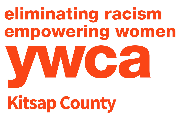Did you know that 1 in 3 women and 1 in 4 men will experience some form of domestic violence in their lifetime? Anyone of any race, age, sexual orientation, gender, socioeconomic status, or religion can be a victim – or perpetrator – of domestic violence, but no one deserves to live in fear.
YWCA 24-Hour Hotline: 1-800-500-5513
YWCA 24-Hour Text Line: 1-360-277-7607
YWCA Kitsap County Brochure Online
YWCA Kitsap County DV Brochure Online
Friends and Family Guide
Power and Control Wheel
Power and Control Wheel for Immigrant Women (English)
Power and Control Wheel for Immigrant Women (Español)
Power and Control Wheel for LGBTQIA+ People
Teen Power and Control Wheel
Equality Wheel
Domestic violence (DV) refers to any relationship where someone maintains power and control over another person in a household. This could be spouses, dating partners, siblings, parents and children, friends, and roommates.
Intimate partner violence (IPV) is domestic violence by a current or former spouse, dating partner, or other relationship engaged in intimacy against the other spouse or partner.
Domestic Violence is a Pattern of Control to Maintain Power over Another. Abuse includes:
Intimidation. The person makes you feel afraid by using looks, actions, or gestures. They smash things or destroy your property. They abuse pets or display weapons.
Emotional Abuse. The person makes you feel bad about yourself, calls you names, makes you think you are “crazy,” humiliates you, or makes you feel guilty.
Isolation. The person controls what you do, who you talk to, and what you wear. They limit your outside involvement and label your family and friends as bad influences, or bad/”crazy” people. They use jealousy to justify their actions.
Minimizing, Denying, and Blaming. The person makes light of the abuse and doesn’t take your concerns seriously. They deny the abuse ever happened or shift responsibility for the abusive behavior. They accuse you of causing the abuse or blame the abuse on their mental health or substance use such as alcohol.
Children. The person makes you feel guilty about the children. They use the children to relay messages to you to make you feel inadequate or bad about the situation. They use visitation times to harass you. They threaten to take the children away and accuse you of being a bad parent.
Economic Abuse. The person prevents you from getting or keeping a job, makes you ask for money, takes your money, and/or doesn’t let you know about or have access to the family income.
Coercion and Threats. The person is making and/or carrying out threats intended to harm you or someone else. They threaten to leave you, commit suicide, or report you to welfare or Child Protective Services. They pressure you to drop any charges filed against them or force you to commit crimes.
Physical Abuse. The person inflicts or attempts to inflict injury, physically restrains you, throws objects, and/or forces you to go somewhere you don’t want to go or do something you don’t want to do.
Sexual Abuse. The person engages in any sexual contact without your consent. They force, manipulate pressure, or trick you into any sexual activity. They force you into prostitution or pornography. They refuse to use safe sex practices or prevent you from using birth control. They videotape or photograph sexual acts without your consent. They insist on anything sexual that makes you uncomfortable or feel fear.
